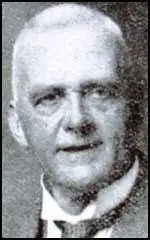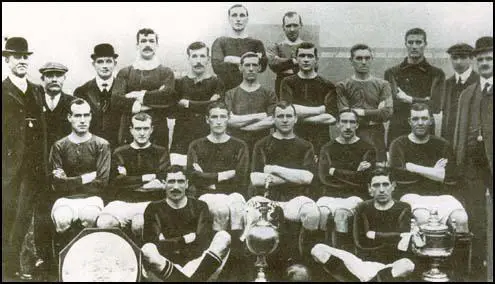Ernest Mangnall

James Ernest Mangnall, the son of a joiner, was born in Bolton in 1866. He was educated at Bolton Grammar School where he played inside-right for the school football team. Later he was selected for Lancashire County.
A keen supporter of Bolton Wanderers, he eventually became a director of the club. He also served as the club secretary but had little success and Bolton was relegated in the 1898-99 season. Mangnall now joined Burnley as their secretary/manager.
Burnley were relegated in the 1899-1900 season. Mangnall's integrity was brought into question when Burnley's goalkeeper, Jack Hillman was found guilty of trying to bribe Nottingham Forest players to lose the last game of the season in order to avoid relegation into the Second Division. Hillman was found guilty and banned for a year.
At the end of the 1902-03 season James West and Harry Stafford of Manchester United were suspended by the Football Association for making illegal payments to players. Mangnall, who had failed to get Burnley promoted to the First Division, was appointed as United's new manager. This decision shocked the fans as he had achieved little success at his former clubs. Nor did he have a reputation for getting his teams to play good football. As the authors of The Essential History of Manchester United pointed out: "Mangnall... preached a gospel of physical fitness and team spirit while maintaining that players should be given a ball only once a week".
John Henry Davies, the new owner of Manchester United, was a rich businessman and was willing to provide Mangnall with the funds to build a good team. Magnall made several new signings. Probably the most significant was Charlie Roberts, who cost a record transfer fee of £600. Other important signings included Charlie Sagar, George Wall, John Peddie, John Picken, Thomas Blackstock and Alec Bell.
In the 1905-06 season Manchester United won promotion to the First Division when they finished second to Bristol City. The club scored 90 goals in 38 games and top scorers were John Picken (20), John Peddie (18) and Charlie Sagar (16). Manchester United's defence was also impressive and only let in 28 goals that season. Charlie Roberts played at centre-half and he was flanked by two outstanding wing-halves, Dick Duckworth and Alec Bell.
Manchester City, who were playing in the First Division, also did well that season. City needed to beat Aston Villa on the final day of the season to win the championship. Villa won the game 3-1 and City finished third, two points behind Newcastle United.
After the game Alec Leake, the captain of Aston Villa, claimed that Billy Meredith had offered him £10 to throw the game. Meredith was found guilty of this offence by the Football Association and was fined and suspended from playing football for a year. Manchester City refused to provide financial help for Meredith and so he decided to go public about what really was going on at the club: "What was the secret of the success of the Manchester City team? In my opinion, the fact that the club put aside the rule that no player should receive more than four pounds a week... The team delivered the goods, the club paid for the goods delivered and both sides were satisfied." This statement created a sensation as the FA had imposed a £4 a week maximum wage on all clubs in 1901.
The Football Association now carried out an investigation into the financial activities of Manchester City. They discovered that City had been making additional payments to all their players. Tom Maley was suspended from football for life and City was fined £250. Seventeen players were fined and suspended until January 1907. City was also forced to sell their players and at an auction at the Queen's Hotel in Manchester. Ernest Mangnal signed the outstandingly gifted, Billy Meredith for only £500. Mangnal also purchased three other talented members of the City side, Herbert Burgess, Sandy Turnbull and Jimmy Bannister.
Manchester United started off the 1907-08 season with three straight wins. They were then beaten 2-1 by Middlesbrough. However, this was followed by another ten wins and United quickly built up a good advantage over the rest of the First Division. Although Liverpool beat them 7-4 on 25th March, 1908, Manchester United went on to win the title by nine points. Top scorers were Sandy Turnbull (25), George Wall (19), Jimmy Turnbull (10) and Billy Meredith (10).
Ernest Mangnall had created an impressive team that was solid in defence and exciting in attack. The former Southampton player, Harry Moger, was a reliable goalkeeper who played in 38 league games that season. Dick Holden (26) or George Stacey (18) competed for the right-back position whereas Herbert Burgess (27) was the left-back. It has been argued that the half-back line of Dick Duckworth (35), Charlie Roberts (32) and Alec Bell (35) was the heart-beat of the side. Billy Meredith (37) and George Wall (36) were probably the best wingers playing in the Football League at the time and provided plenty of service for the inside trio of Sandy Turnbull (30), Jimmy Turnbull (26) and Jimmy Bannister (36). The championship winning team included four players purchased from Manchester City at an auction at the Queen's Hotel in October 1906.

The following season Manchester United enjoyed a good run in the FA Cup. They beat Brighton & Hove Albion (1-0), Everton (1-0), Blackburn Rovers (6-1), Burnley (3-2) and Newcastle United (1-0) to reach the final. Newcastle, who went onto win the league that season, was obviously disappointed by being prevented from winning the double. However, the whole of the Newcastle team waited for 15 minutes in torrential rain aboard an open coach so they could applaud their conquerors after the game.
Jimmy Turnbull (5), Harold Halse (4) and Sandy Turnbull (3) got the goals during the successful cup run that got them to the final at Crystal Palace against Bristol City. As both clubs usually wore red, Bristol played in blue whereas Manchester United played in white shirts with a deep red "V". The game was disappointing and Sandy Turnbull scored the only goal in the 22nd minute.
Manchester United was clearly one of the best clubs in the England, yet its ground was one of the worst in the First Division. John Henry Davies decided to loan the club £60,000 in order that they could build a new stadium with an 80,000 capacity. When it was completed the stadium had the largest grandstand in the Football League. It also had a gymnasium, massage room, plunge baths, bars, lifts and tearooms.
The first game at Old Trafford took place on 19th February, 1910. A crowd of 45,000 saw Liverpool beat Manchester United 4-3. This attendance record was beaten a few weeks later when 50,000 saw United beat Bristol City 2-1. The following season, 65,000 watched a FA Cup tie against Aston Villa.
In June 1910 Ernest Mangnal purchased Enoch West from Nottingham Forest. He replaced Jimmy Turnbull in the attack and had a great season scoring 19 goals in 35 games. West formed a great partnership with Sandy Turnbull and together they scored more than half of the team's goals. On the last Saturday of the season Aston Villa led Manchester United by one point. United had to play third-place Sunderland at Old Trafford whereas Aston Villa had to go to Liverpool.
Manchester United won their game 5-1. Charlie Roberts told the Manchester Saturday Post what happened next: "At the end of the game our supporters rushed across the ground in front of the stand to wait for the final news from Liverpool. Suddenly a tremendous cheer rent the air and was renewed again and again and we knew we were the champions once again." Aston Villa had been beaten 3-1 and Manchester United had won their second championship in four years.
In April 1911 Enoch West was involved in an incident at Aston Villa. As a result he was suspended for the first four matches of the 1911-12 season. Despite missing these games he was once again leading scorer with 23 goals in 38 cup and league games. However, his fellow strikers were disappointing and Manchester United finished in only 13th position.
In August 1912, Ernest Mangnall decided to move to Manchester City. During his nine years at the club, Mangnal had completely transformed the fortunes of the club. He was replaced by John J. Bentley, the former president of the Football League.
Manchester City had a good start to the 1912-13 season and won every game in September. The Daily Dispatch reported that it was "nine years have passed since Manchester City commenced a campaign in this stimulating style." However, City could not maintain this pace and by the end of the season they finished 6th, two points behind Manchester United. City finished 15th in 1913-14 and 5th in 1914-15.
The Football League resumed after the First World War in the 1919-20 season. Mangnall made the surprising decision to buy the 46 year old Billy Meredith from Manchester United. That year City finished in 7th place. Mangnall did even better in the 1920-21 season with only Burnley achieving more league points.
In 1923 Mangnall arranged for Manchester City to move to Maine Road. It was popular with the fans and over 76,000 people watched City play Cardiff in the 4th Round of the FA Cup. City won the game but was defeated by Newcastle United in the semi-final. At the end of the season it was decided not to renew Mangnall's contract.
Ernest Mangnall died of a cerebral embolism on 13th January 1932.
